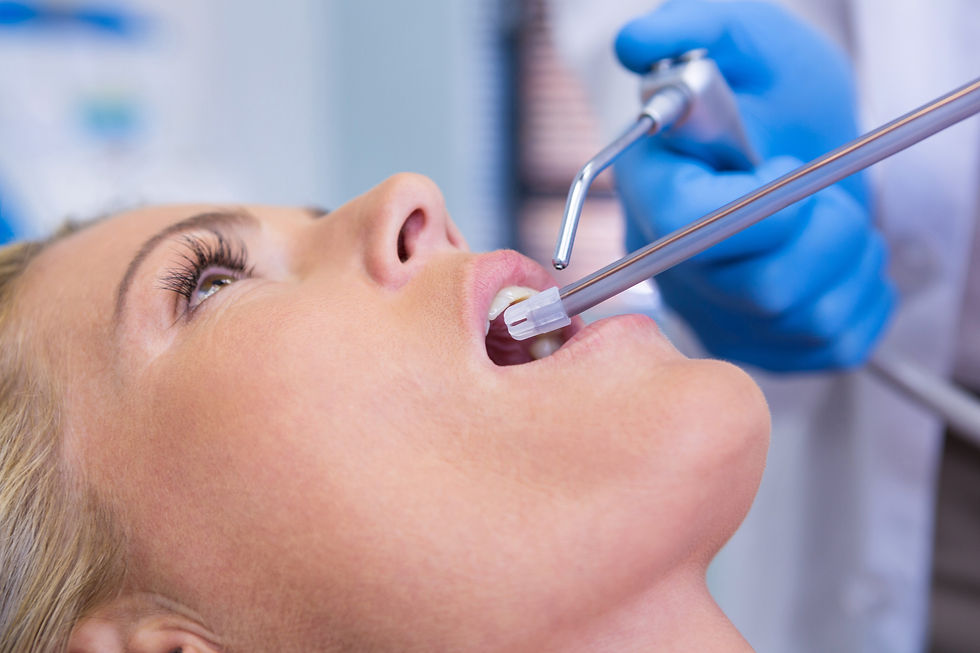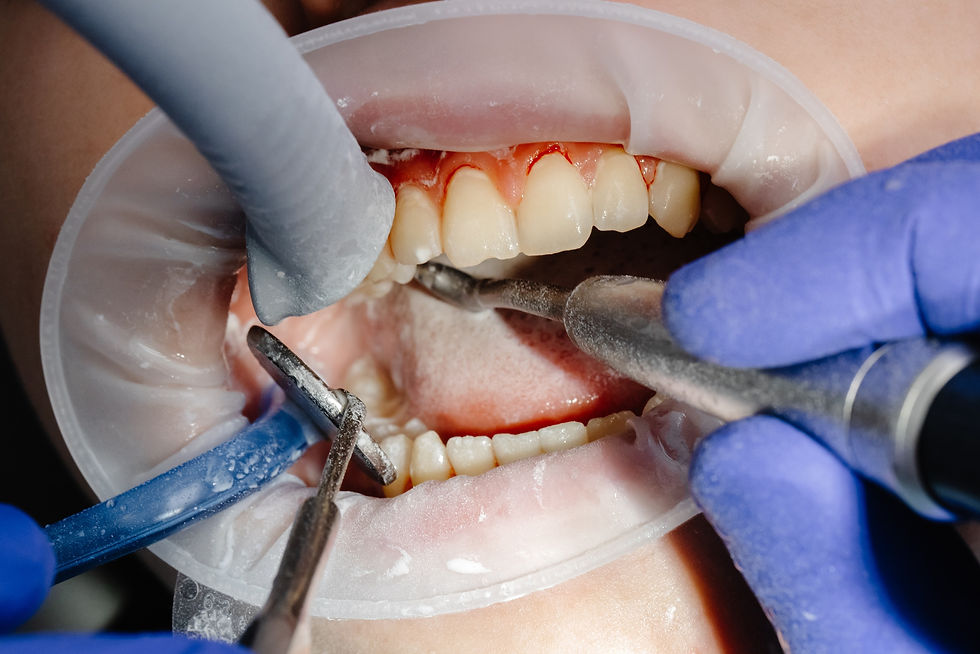What Are the Most Common Causes of Bleeding Gums?
- jonesneville54
- Jul 24, 2025
- 4 min read
Bleeding gums can be alarming—especially when they occur regularly. You might notice blood when brushing or flossing, or even without direct contact. While occasional bleeding may nope be serious, persistent or frequent bleeding is usually a sign of something deeper.
Whether you’re an athlete prioritizing total-body health or someone simply aiming for better oral hygiene, understanding the root causes of bleeding gums can help you take proactive stage to protect your smile.

What Does It Indicate When Your Gums Bleed?
Bleeding gums are not a disease but a symptom—usually of inflammation or irritation in the gum tissue. The bleeding often occurs as a response to plaque buildup, improper brushing, or systemic health issues. Though it may seem minor, untreated bleeding gums can lead to serious dental conditions like gingivitis or periodontitis.
Most Common Bleeding Gums Causes
1. Poor Oral Hygiene
The most common reason for bleeding gums is poor dental hygiene. Forgetting to brush and floss every day lets plaque and bacteria to get along the gum line, which irritates and inflames the gums.
Tips to prevent it:
Brush twice a day for at least two minutes.
Use fluoride toothpaste and a soft-bristled toothbrush.
Floss gently once a day to remove debris between teeth.
Rinse with an antimicrobial mouthwash.
2. Gingivitis (Early Gum Disease)
Gingivitis is a soft state of gum disease characterized by red, swollen, and bleeding gums. It occurs when plaque isn’t removed and begins to irritate the gums. At this stage, gingivitis is reversible with improved dental care.
Symptoms include:
Puffy, red gums
Bleeding while brushing or flossing
Mild tenderness in the gums
3. Periodontitis (Advanced Gum Disease)
When gingivitis is left untreated, it can move to periodontitis—a more serious condition where the inner layer of the gum pulls out from the teeth, forming bags that can become infected.
Advanced symptoms:
Receding gums
Loose teeth
Pus between gums and teeth
Chronic bad breath
This condition requires immediate medicine by a dental specialist.
4. Brushing or Flossing Too Hard
Using too much force while brushing or flossing can cause your gums to bleed. People often assume that brushing harder means cleaning better, but this can damage soft gum tissues.
Better approach:
Use gentle, circular motions while brushing.
Hold the brush at a 45° angle.
Switch to a soft-bristled toothbrush.
Floss with care, avoiding snapping the thread into your gums.
5. Vitamin Deficiencies
Low grades of Vitamin C and Vitamin K can make gums more prone to bleeding.
Vitamin C is important for tissue repair and immune health.
Vitamin K helps with blood clotting.
Include these foods in your diet:
Oranges, berries, and bell peppers for Vitamin C
Leafy greens such as kale and spinach for Vitamin K
6. Hormonal Changes
Women often experience gum sensitivity and bleeding during pregnancy, menstruation, or menopause due to hormonal fluctuations. This condition, known as pregnancy gingivitis, is temporary but should be managed with good oral care.
7. Certain Medications
Some medications thin the blood or reduce saliva production, increasing the risk of gum bleeding.
Common culprits:
Aspirin and other blood thinners
Chemotherapy drugs
Calcium channel blockers
Anticonvulsants
If you’re on any of these medications, inform your dentist so they can adjust your care plan accordingly.
8. Smoking and Tobacco Use
Tobacco use is a major cause of gum irritation and disease. It restricts blood flow, weakens the immune system, and reduces the body’s ability to heal inflamed gum tissue.
Smokers may not notice early symptoms of gum disease because nicotine reduces bleeding, hiding the problem until it’s advanced.
9. Underlying Health Conditions
Bleeding gums may be a sign of systemic health issues, including:
Diabetes – poor circulation and immune response contribute to gum inflammation.
Leukemia – affects the blood’s ability to clot properly.
Blood clotting disorders lead to abnormal bleeding from the gums.
If you have bleeding gums along with fatigue, bruising, or frequent infections, consult your physician.
How to Prevent Bleeding Gums

Maintaining your oral and overall health is key to preventing bleeding gums. Here are practical tips:
Brush & floss daily – but gently.
Visit the dentist every 6 months for a professional cleaning.
Eat a balanced diet rich in vitamins C and K.
Avoid smoking or chewing tobacco.
Stay hydrated to maintain healthy saliva levels.
Manage chronic illnesses, such as diabetes, with regular medical care.
When to See a Dentist
You should visit a dentist if:
Bleeding gums persist for more than a week
Your gums are swollen, red, or painful
You notice bad breath, loose teeth, or gum recession
Bleeding happens spontaneously (not related to brushing)
Early diagnosis and treatment can prevent irreversible gum damage and protect your overall health.
Frequently Asked Questions (FAQs)
Q1. Is it normal for gums to bleed while brushing?
Occasional bleeding may happen if you're brushing too hard or haven’t flossed in a while. However, regular bleeding is not normal and could indicate gingivitis or other gum issues.
Q2. What vitamin helps stop bleeding gums?
Vitamin C and Vitamin K both play a role. Vitamin C supports gum tissue healing, while Vitamin K is important for blood clotting.
Q3. Can stress because bleeding gums?
Yes. Stress weakens the immune system, making it harder for your body to fight off gum infections. It may also lead to neglecting proper oral hygiene.
Q4. Should I floss if my gums bleed?
Yes, but gently. Bleeding while flossing typically indicates that your gums are inflamed. Continued gentle flossing can help improve gum health over time.
Q5. Can mouthwash help bleeding gums?
An antibacterial mouthwash can help reduce plaque and bacteria, soothing inflamed gums. However, it should be used along with brushing and flossing—not as a replacement.
Conclusion
Bleeding gums are often a warning sign that shouldn’t be ignored. While poor oral hygiene is the leading cause, there are several bleeding gums causes—from vitamin deficiencies to medical conditions.
The good news? Most cases are preventable and treatable. Whether you’re chasing performance as an athlete or just seeking a healthier lifestyle, consistent oral care and regular dental visits can make all the difference. If bleeding persists, don’t hesitate to consult a dental professional.


Comments